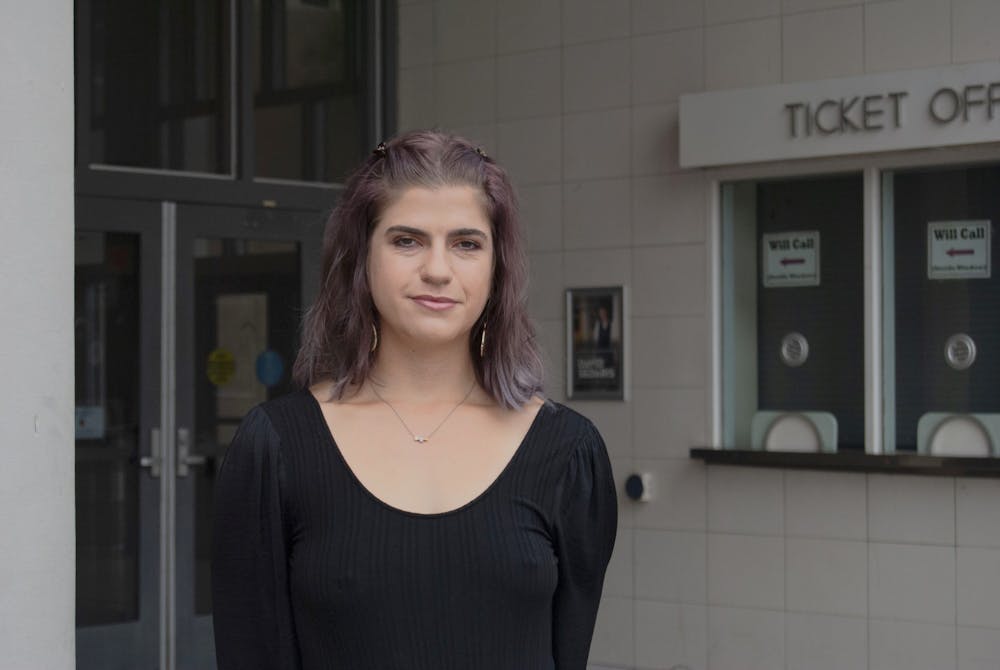At this year’s Linnell Festival of New Plays at the University of New Mexico, graduate student Julia Storch debuted her first staged play, “Smokebox.” The play explores the vulnerability of humans in all their imperfect perfection.
“Smokebox” is about a queer couple who meet again many years after their high school relationship ended — one of them has a form of dementia, and memories and present-day become mixed within the play.
The complications of the central relationship are what appealed to Rhiannon Frazier, director of the “Smokebox” inaugural staging.
“It's very vulnerable, very present. ‘‘Smokebox’’ resonated with me for a few reasons, but most of all is that I loved that it was this imperfect representation of queer love. So often we see these stories where society is keeping these two lovers apart or once they find each other it fixes everything. Smokebox allows this space for two imperfect people to be in their imperfect relationship,” Frazier wrote to the Daily Lobo.
The first threads of the play came to Storch when she decided to explore the concept of a relationship reunited after many years. After experiencing a family member’s battle with dementia, she decided to incorporate elements of memory.
“A family member of mine, a couple years ago, started getting dementia and came to a family gathering and said some stuff that we were really surprised by. We’ll never know if they actually thought that or if it was the brain sickness, and so I became really interested in what happens when our brain betrays us,” Storch said.
The preparation for “Smokebox” was a whirlwind three week rehearsal block. Frazier first became involved with the production after a cohort of Storch’s passed the piece onto her; she was drawn to the vulnerability of Storch’s piece, in which characters “have their chests open to you right away,” according to Frazier.
Frazier was struck by Storch’s enthusiasm, kindness and openness when the two initially met and began working together.
“Julia is incredibly positive. It radiates out of her. She is always so upbeat, funny — she's really in the room with you. She's a joy,” Frazier wrote.
Storch is interested in the hyperreal and poeticism which stretches beyond naturalistic conventions in dialogue. Much of the piece is made up of her previously written prose essays.
For Storch, the most rewarding part of writing has been seeing how her work is interpreted by others. This was especially true for “Smokebox,” as this is the first time one of her plays has turned into a staged production — from direction to set design, she was amazed to see an entire team’s interpretation of the play.
“It’s rewarding when I write something and people interpret it the way I want it. … People come at art with completely different mindsets and stuff, so knowing that I’ve communicated something well enough for anyone to understand is definitely rewarding,” Storch said.
Get content from The Daily Lobo delivered to your inbox
Storch initially got into the world of dramatic writing with intentions of writing for the screen. She first became interested in the work after watching the TV series “Buffy the Vampire Slayer,” which she said treated its audience “like intelligent beings” in a way that she hadn’t seen before. She began to shift gears into theater, however, when she got into UNM’s dramatic writing master’s program.
“There’s something about being in a space with other people and having live bodies on the stage performing that you can’t really replicate with film or TV. And I think you can do some really interesting high concept stuff with theater that you can’t do as much with film or TV … It reads very differently I think, because it’s a 2D image instead of real bodies,” Storch said.
One of the key parts of Storch’s writing, for her, is that she conveys empathy and understanding, even for people who are flawed, as her characters often are.
“In this particular play, my main character does a lot of not-kind things to other people that she cares about, and I’m not saying it’s a good thing but I’m saying it’s something that everyone’s done and we can still be worth love,” Storch said. “I guess there’s an element of self-forgiveness that I’m interested in and having grace for yourself as well as others.”
Zara Roy is the copy chief at the Daily Lobo. She can be contacted at copychief@dailylobo.com or on Twitter @DailyLobo






